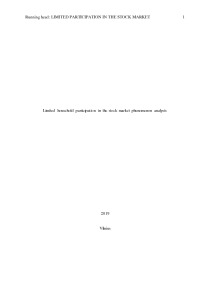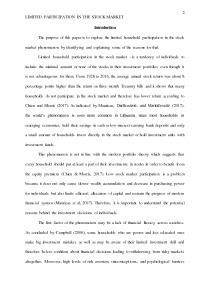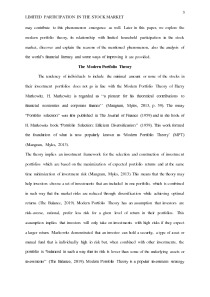Limited Household Participation In The Stock Market Phenomenon Analysis



The Modern Portfolio Theory. Different determinants of the problem. Appendix Financial Literacy Around the World. Appendix Test for evaluating financial literacy.
Limited household participation in the stock market - is a tendency of individuals to include the minimal amount or none of the stocks in their investment portfolios even though it is not advantageous for them. From 1928 to 2016, the average annual stock return was about 8 percentage points higher than the return on three-month Treasury bills and it shows that many households do not participate in the stock market and therefore has lower return according to Chien and Morris (2017). As indicated by Mauricas, Darškuvienė, and Mariničevaitė (2017), the world’s phenomenon is even more common in Lithuania since most households in emerging economies, hold their savings in cash or low-interest-earning bank deposits and only a small amount of households invest directly in the stock market or hold investment units with investment funds.
The first factor of the phenomenon may be a lack of financial literacy across societies. As concluded by Campbell (2006), some households who are poorer and less educated ones make big investment mistakes as well as may be aware of their limited investment skill and therefore be less confident about financial decisions leading to withdrawing from risky markets altogether. Moreover, high levels of risk aversion, misconceptions, and psychological barriers may contribute to this phenomenon emergence as well. Later in this paper, we explore the modern portfolio theory, its relationship with limited household participation in the stock market, discover and explain the reasons of the mentioned phenomenon, also the analysis of the world’s financial literacy and some ways of improving it are provided.
The tendency of individuals to include the minimal amount or none of the stocks in their investment portfolios does not go in line with the Modern Portfolio Theory of Harry Markowitz. H. Markowitz is regarded as ‘‘a pioneer for his theoretical contributions to financial economics and corporate finance’’ (Mangram, Myles, 2013, p. 59). The essay “Portfolio selection” was first published in The Journal of Finance (1959) and in the book of H. Markowitz book “Portfolio Selection: Efficient Diversification’’ (1959). This work formed the foundation of what is now popularly known as ‘Modern Portfolio Theory’ (MPT) (Mangram, Myles, 2013).
The theory implies an investment framework for the selection and construction of investment portfolios which are based on the maximization of expected portfolio returns and at the same time minimization of investment risk (Mangram, Myles, 2013). This means that the theory may help investors choose a set of investments that are included in one portfolio, which is combined in such way that the market risks are reduced through diversification while achieving optimal returns (The Balance, 2019).
- Economy & Finance Papers
- Microsoft Word 94 KB
- 2019 m.
- English
- 19 pages (4250 words)
- University
- Ema

















